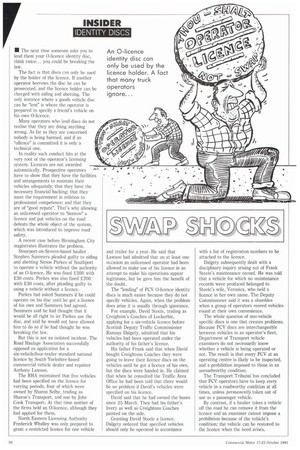INSIDER
Page 28

If you've noticed an error in this article please click here to report it so we can fix it.
IDENTITY DISCS
The next time someone asks you to lend them your 0-licence identity disc, think twice... you could be breaking the law.
The fact is that discs can only be used by the holder of the licence. If another operator borrows the disc he can be prosecuted, and the licence bolder can be charged with aiding and abetting. The only instance where a goods vehicle disc can be "lent" is where the operator is prepared to specify a friend's vehicle on his own 0-licence.
Many operators who lend discs do not realise that they are doing anything wrong. As far as they are concerned nobody is being harmed, and if an "offence" is committed it is only a technical one.
In reality such conduct hits at the very root of the operator's licensing system. Licences are not awarded
automatically. Prospective operators yt have to show that they have the facilities and arrangements to maintain their vehicles adequately; that they have the necessary financial backing; that they meet the requirement in relation to professional competence; and that they are of "good repute". That's why allowing an unlicensed operator to "borrow" a licence and put vehicles on the road defeats the whole object of the system, which was introduced to improve road safety.
A recent case before Birmingham City magistrates illustrates the problem.
Stourport-on-Severn-based haulier Stephen Summers pleaded guilty to aiding and abetting Simon Parkes of Southport to operate a vehicle without the authority of an 0-licence. He was fined £200 with £30 costs. Parkes was also fined £200 with £30 costs, after pleading guilty to using a vehicle without a licence.
Parkes had asked Summers if he could operate on his disc until he got a licence of his own and Summers had agreed. Summers said he had thought that it would be all right to let Parkes use the disc, and said he would not have allowed him to do so if he had thought he was breaking the law.
But this is not an isolated incident. The Road Haulage Association successfully opposed an application for a six-vehicle/four-trailer standard national licence by South Yorkshire-based commercial vehicle dealer and repairer Anthony Lawson.
The RHA maintained that five vehicles had been specified on the licence for varying periods, four of which were owned by Sharon Selby, trading as Sharon's Transport, and one by John Cook Transport. At that time neither of the firms held an 0-licence, although they had applied for them.
North Eastern Licensing Authority Frederick Whalley was only prepared to grant a restricted licence for one vehicle and trailer for a year. He said that Lawson had admitted that on at least one occasion an unlicensed operator had been allowed to make use of his licence in an attempt to make his operations appear legitimate, but he gave him the benefit of the doubt, The "lending" of PCV 0-licence identity discs is much easier because they do not specify vehicles, Again, when the problem does arise it is usually through ignorance.
For example, David Steele, trading as Creighton's Coaches of Lockerbie, applying for a six-vehicle licence before Scottish Deputy Traffic Commissioner Ramsay Dalgety, admitted that his vehicles had been operated under the authority of his father's licence.
His father Frank said that when David bought Creightons Coaches they were going to leave their licence discs on the vehicles until he got a licence of his own, but the discs were handed in. He claimed that when he consulted the Traffic Area Office he had been told that there would be no problem if David's vehicles were specified on his licence.
David said that he had owned the buses since 25 March. They had his father's livery as well as Creightons Coaches painted on the side.
Granting David Steele a licence, Dalgety ordered that specified vehicles should only be operated in accordance with a list of registration numbers to be attached to the licence.
Dalgety subsequently dealt with a disciplinary inquiry arising out of Frank Steele's maintenance record. He was told that a vehicle for which no maintenance records were produced belonged to Steele's wife, Veronica, who held a licence in her own name. The Deputy Commissioner said it was a shambles when a group of operators moved vehicles round at their own convenience.
The whole question of non-vehicle specific discs is one that creates problems. Because PCV discs are interchangeable between vehicles in an operator's fleet, Department of Transport vehicle examiners do not necessarily know whether a vehicle is being operated or not. The result is that every PCV at an operating centre is likely to be inspected, and a prohibition imposed to those in an unroadworthy condition.
The Transport Tribunal has concluded that PCV operators have to keep every vehicle in a roadworthy condition at all times, unless permanently taken out of use as a passenger vehicle.
By contrast, if a haulier takes a vehicle off the road he can remove it from the licence and an examiner cannot impose a prohibition because of the vehicle's condition; the vehicle can be restored to the licence when the need arises.




















































































